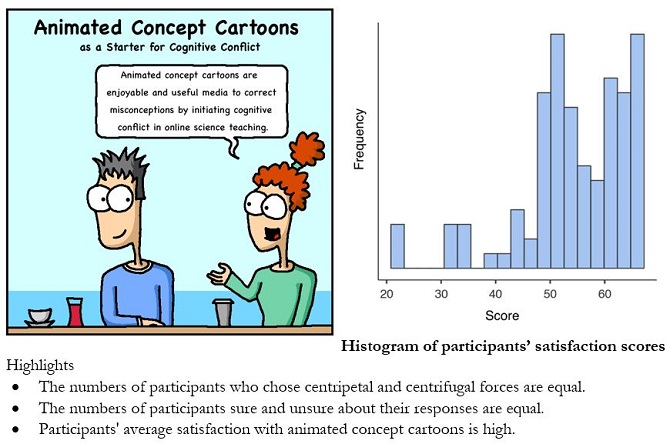
Animated Concept Cartoons as a Starter for Cognitive Conflict in Online Science Learning: A Case of Circular Motion
Abstract
Before taking formal science education, learners usually construct preconceptions based on their daily life experiences, many of which are scientifically unacceptable misconceptions. In formal science learning, new concepts often contradict these misconceptions. To correct a misconception, it is first needed to create dissatisfaction about it by initiating cognitive conflict. This study aims to create an animated concept cartoon about circular motion and evaluate its usability to start cognitive conflict about centrifugal force misconception in online learning. This is a one-group quasi-experimental study whose participants are 110 undergraduate students with non-science backgrounds. An animated concept cartoon about circular motion and an online data collection instrument were developed and implemented for the participants. Results showed that half of the participants might be considered to be in a status of cognitive conflict after reading the animated concept cartoon. In addition, participants' overall satisfaction with the animated concept cartoon was found to be relatively high. Participants' satisfaction with the animated concept cartoon was equal for students with and without cognitive conflict. In the context of these findings, the animated concept cartoon may be considered an enjoyable and useful learning activity to initiate cognitive conflict in online science learning.
Full Text:
Download PDFReferences
Atasoy, S. (2020). Using Concept Cartoons to Identify the Epistemological Beliefs of Middle School Students. Journal of Science Learning, 3(3), 165-173. https://files.eric.ed.gov/fulltext/EJ1267613.pdf
Bani-Salameh, H. N. (2016). How persistent are the misconceptions about force and motion held by college students? Physics Education, 52(1), 1-7. https://doi.org/10.1088/1361-6552/52/1/014003
Barrouillet, P. (2015). Theories of cognitive development: From Piaget to today. Developmental Review, 38(1), 1-12. https://doi.org/10.1016/j.dr.2015.07.004
Basarmak, U., & Mahiroglu, A. (2016). The Effect of Online Learning Environment Based on Caricature Animation Used in Science and Technology Course on the Success and Attitude of the Student for Humor. Turkish Online Journal of Educational Technology-TOJET, 15(4), 107-118. https://files.eric.ed.gov/ fulltext/EJ1117641.pdf
Chin, C., & Teou, L. Y. (2009). Using concept cartoons in formative assessment: Scaffolding students’ argumentation. International Journal of Science Education, 31(10), 1307-1332.
Cinar, D. (2017). The opinions of teacher candidates about the use of concept cartoon in science and technology teaching courses. Contemporary Educational Researches Journal, 7(2), 50-56. https://pdfs.semanticscholar.org/ 5174/ed4d8661c300b65cec8129226da17591f68a.pdf
Clement, J. (1982). Students’ preconceptions in introductory mechanics. American Journal of Physics, 50(1), 66-71. http://zyzx.haust.edu.cn/moocresource/data/20091115/U/MIT20091115083/OcwWeb/Urban-Studies-and-Planning/11-125Spring-2009/CalendarandAssignments/students_preconceptions_in_introductory_mechanics.pdf
Ekici, F., Ekici, E., & Aydin, F. (2007). Utility of Concept Cartoons in Diagnosing and Overcoming Misconceptions Related to Photosynthesis. International Journal of Environmental and Science Education, 2(4), 111–124.
Franklin, B. J. (1992). The Development, Validation, and Application of a Two-Tier Diagnostic Instrument to Detect Misconceptions in the Areas of Force, Heat, Light and Electricity [Doctoral Dissertation, Lousiana State University]. https://digitalcommons.lsu.edu/gradschool_disstheses/5302
Höffler, T. N., & Leutner, D. (2007). Instructional animation versus static pictures: A meta-analysis. Learning and instruction, 17(6), 722-738. https://www.sciencedirect.com/science/article/pii/S0959475207001077
Kabapinar, F. (2005). Effectiveness of teaching via concept cartoons from the point of view of constructivist approach. Educational Science: Theory & Practice, 5(1), 135–146. https://www.researchgate.net/profile/Filiz-Kabapinar-2/publication/ 265411400_Effectiveness_of_Teaching_via_Concept_Cartoons_from_the_Point_of_View_of_Constructivist_Approach/links/57d03fc708ae5f03b4890a3c/Effectiveness-of-Teaching-via-Concept-Cartoons-from-the-Point-of-View-of-Constructivist-Approach.pdf
Kaltakci Gurel, D., Eryilmaz, A., & McDermott, L. C. (2015). A review and comparison of diagnostic instruments to identify students’ misconceptions in science. Eurasia Journal of Mathematics, Science & Technology Education, 11(5), 989–1008. https://open.metu.edu.tr/bitstream/handle/11511/38957/index.pdf
Kandil Ingec, S. (2008). Use of Concept Cartoons as an Assessment Tool in Physics Education. US-China Education Review, 5(11), 47–54. https://files.eric.ed.gov/fulltext/ED503880.pdf
Kang, S., Scharmann, L. C., & Noh, T. (2004). Reexamining the role of cognitive conflict in science concept learning. Research in science education, 34(1), 71-96.
Keogh, B., Naylor, S., & Wilson, C. (1998). Concept Cartoons: A New Perspective on Physics Education. Physics Education, 33(4), 219–224. https://link.springer.com/content/pdf/10.1023/B:RISE.0000021001.77568.b3.pdf
Keogh, B., & Naylor, S. (2000). Teaching and learning in science using concept cartoons: why Dennis wants to stay in at playtime. Investigating, 16(3), 10-14.
Kinik Topalsan, A., & Bayram, H. (2019). Identifying prospective primary school teachers’ ontologically categorized misconceptions on the topic of "force and motion". Journal of Turkish Science Education, 16(1), 85-109. https://www.tused.org/index.php/tused/article/download/221/174/
Kumi-Manu, R. N. (2021). Concept Cartoon as a Teaching Technique for Conceptual Change: A Ghanaian Junior High School Experience. American Journal of Educational Research, 9(9), 587-599. http://article.scieducationalresearch.com/pdf/education-9-9-5.pdf
Kusumaningrum, I. A., & Indriyanti, N. Y. (2018). Concept cartoons for diagnosing student’s misconceptions in the topic of buffers. Journal of Physics: Conference Series, 1022(1), 012036
Naylor, S., & Keogh, B. (2013). Concept cartoons: What have we learnt? Journal of Turkish Science Education, 10(1), 3–11. https://www.tused.org/index.php/tused/article/download/273/223/
Norfarah, N., Mohd Ali, S., & Chong, L. Y. (2019). Concept Cartoon: A Constructivist Strategy to Enhance Positive Attitude towards Science in Malaysia: An ANCOVA Repeated Measures Approach. International Journal of Education, Psychology and Counseling, 4(27), 28-40.
Pine, K., Messer, D., & St. John, K. (2001). Children's misconceptions in primary science: A survey of teachers' views. Research in Science & Technological Education, 19(1), 79-96. https://www.tandfonline.com/doi/pdf/10.1080/02635140120046240
Posner, G. J., Strike, K. A., Hewson, P. W., & Gertzog, W. A. (1982). Accommodation of a scientific conception: Toward a theory of conceptual change. Science education, 66(2), 211-227. http://www.ud.infn.it/URDF/laurea/idifo1/materiali/g5/Posneretal.pdf
Sanliturk, A. D., & Zeybek, G. (2022). The Effect of Using Digital Concept Cartoons in Science Lesson on Students’ Achievement. Journal of Science Learning, 5(1), 1-13. https://ejournal.upi.edu/index.php/jslearning/article/view/121/pdf
Serttas, S., & Turkoglu, A. Y. (2020). Diagnosing students’ misconceptions of astronomy through concept cartoons. Participatory Educational Research, 7(2), 164-182. https://dergipark.org.tr/en/download/article-file/1086989
Stephenson, P., & Warwick, P. (2002). Using concept cartoons to support progression in students' understanding of light. Physics Education, 37(2), 135.
Taslidere, E. (2014). Effect of Conceptual Change Instruction on Remedying Misconceptions Concerning Direct Current Circuits. Bartin Üniversitesi Egitim Fakültesi Dergisi, 3(1), 200.
Volfson, A., Eshach, H., & Ben-Abu, Y. (2020). Identifying physics misconceptions at the circus: The case of circular motion. Physical Review Physics Education Research, 16(1), 1-11. https://doi.org/10.1103/PhysRevPhysEducRes.16.010134
DOI: https://doi.org/10.17509/jsl.v5i2.41191
Refbacks
- There are currently no refbacks.
Copyright (c) 2022 Ertugrul Ozdemir

This work is licensed under a Creative Commons Attribution-ShareAlike 4.0 International License.


Jl. Dr. Setiabudhi 229 Bandung 40154, West Java, Indonesia










